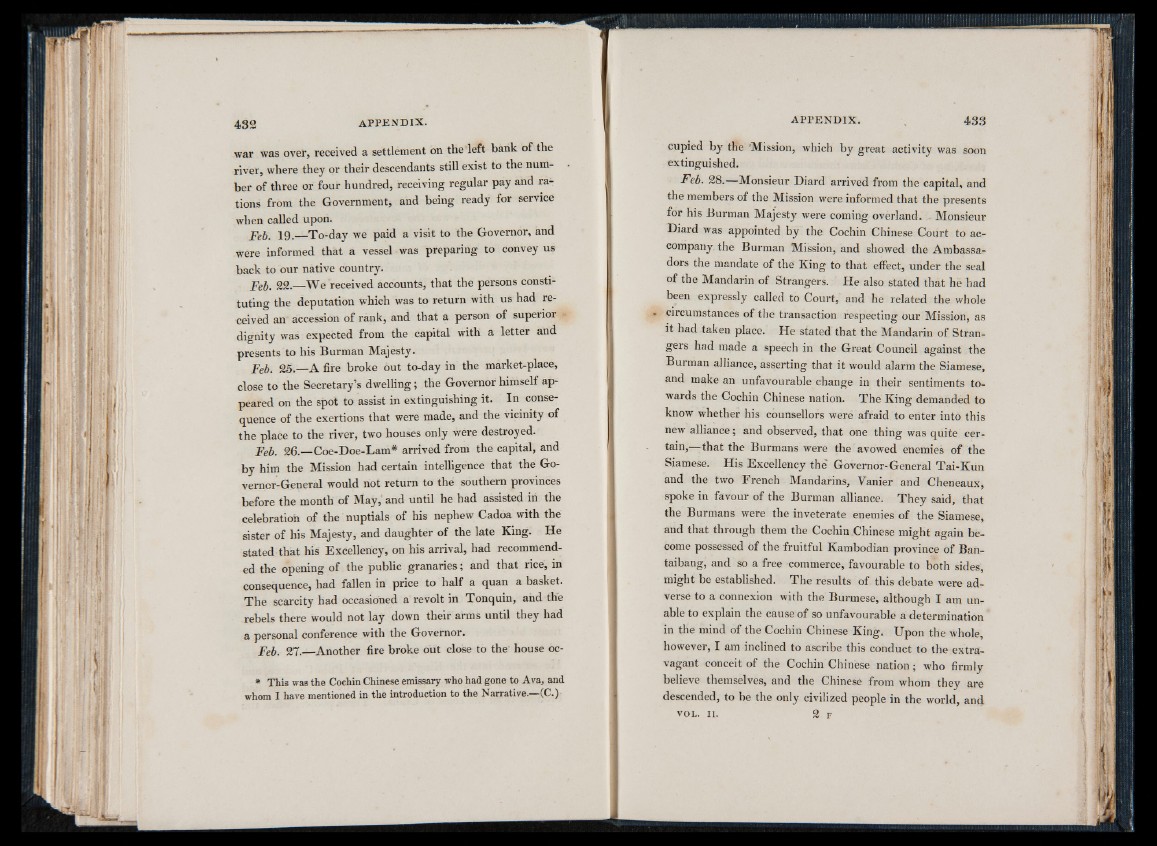
war was over, received a settlement on the left bank of the
river, where they or their descendants still exist to the number
of three or four hundred, receiving regular pay and rations
from the Government* and being ready for service
when called upon.
Feb. 19. To-day we paid a visit to the Governor, and
were informed that a vessel was preparing to convey us
back to our native country.
Feb. 22.—W e received accounts, that the persons constituting
the deputation which was to return with us had received
an accession of rank, and that a person of superior
dignity was expected from the capital with a letter and
presents to his Burman Majesty.
Feb. 25.—A fire broke out to-day in the market-place,
close to the Secretary’s dwelling; the Governor himself appeared
on the spot to assist in extinguishing it. In consequence
of the exertions that were made, and the vicinity of
the place to the river, two houses only were destroyed.
Feb. 26.—Coe-Doe-Lam* arrived from the capital, and
by him the Mission had certain intelligence that the Governor
General would not return to the southern provinces
before the month of May, and until he had assisted in the
celebration o f the nuptials of his nephew Cadoa with the
sister of his Majesty, and daughter of the late King. He
stated that his Excellency, on his arrival, had recommended
the opening o f the public granaries; and that rice, in
consequence, had fallen in price to half a quan a basket.
The scarcity had occasioned a revolt in Tonquin, and the
rebels there would not lay down their arms until they had
a personal conference with the Governor.
Feb. 27.—Another fire broke out close to the house oc*
This was the Cochin Chinese emissary who had gone to Ava, and
whom I have mentioned in the introduction to the Narrative.—(C.)
cupied by the Mission, which by great activity was soon
extinguished.
Feb. 28.—Monsieur Diard arrived from the capital, and
the members of the Mission were informed that the presents
for his Burman Majesty were coming overland. Monsieur
Diard was appointed by the Cochin Chinese Court to accompany.
the Burman Mission, and showed the Ambassadors
the mandate o f the King to that effect, under the seal
o f the Mandarin o f Strangers. He also stated that he had
been expressly called to Court, and he related the whole
• circumstances of the transaction respecting our Mission, as
it had taken place. He stated that the Mandarin of Strangers
had made a speech in the Great Council against the
Burman alliance, asserting that it would alarm the Siamese,
and make an unfavourable change in their sentiments towards
the Cochin Chinese nation. The King demanded to
know whether his counsellors were afraid to enter into this
new alliance; and observed, that one thing was quite certain,—
that the Burmans were the avowed enemies o f the
Siamese. His Excellency the Governor-General Tai-Kun
and the two French Mandarins, Vanier and Cheneaux,
spoke in favour of the Burman alliance. They said, that
the Burmans were the inveterate enemies o f the Siamese,
and that through them the Cochin Chinese might again become
possessed o f the fruitful Kambodian province o f Ban-
taibang, and so a free commerce, favourable to both sides,
might be established. The results o f this debate were adverse
to a connexion with the Burmese, although I am unable
to explain the cause o f so unfavourable a determination
in the mind of the Cochin Chinese King. Upon the whole,
however, I am inclined to ascribe this conduct to the extra-
vagant conceit of the Cochin Chinese nation; who firmly
believe themselves, and the Chinese from whom they are
descended, to be the only civilized people in the world, and
VOL. I I . 2 F